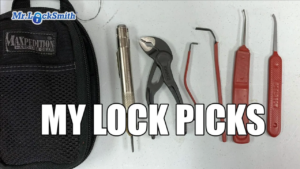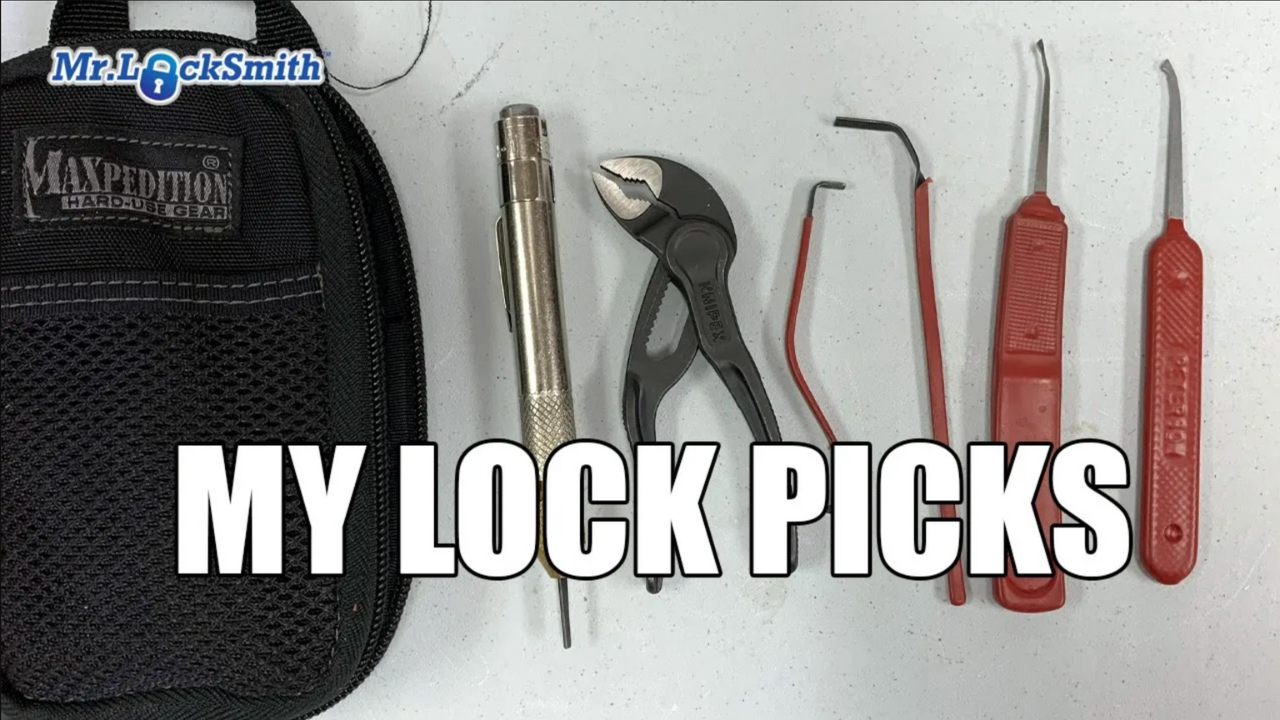Starting Out with Lock Picking: The Five Tools You Need. Terry’s passion for lock picking and offers guidance for beginners on essential tools needed to start. Terry emphasizes the importance of having a diamond pick, rake, hook, and two tension wrenches (springy and rigid). A recommended beginner kit, the HPC NDPK 24, is introduced, highlighting its comprehensive selection of picks and tools, including key extractors. The speaker advises sticking to the basics while practicing and mentions additional resources available on their website for further learning.
Starting Out with Lock Picking
The Five Tools You Need
Building Your Starter Kit
Mr. Locksmith™ recommends starting with a basic kit like the HPC NDPK 24. This kit includes way more tools than you’ll ever need as a beginner, but it’s great for growing into more advanced lock picking as well. Starting Out with Lock Picking is a good place for beginers.
“This is the kit our beginner locksmiths and trainees get,” he explains. The kit comes with several picks, tension wrenches, and even tools to remove broken keys. As a beginner, stick with the basics:
- Basic Picks: Diamond, rake, and hook picks as mentioned earlier.
- Tension Wrenches: A variety of tension wrenches, including both springy and rigid types.
- Additional Picks: Though more advanced picks are included, it’s best to focus on the beginners’ picks first.
- Broken Key Extractor: An essential tool for locksmiths to remove broken keys from locks.
– Miscellaneous Tools: Various other tools that will become useful as you advance in your lock-picking skills.
https://mr-locksmith-training.thinkific.com/courses/online-locksmith-course
Starting Out with Lock Picking

Practice Makes Perfect
The best way to become proficient in lock picking is through practice. Initially, focus on using your diamond, rake, and hook picks along with both types of tension wrenches. Everyone has their own preferences, so find what works best and feels most comfortable for you.
Many expert lock pickers prefer using hook picks for their precision. While the tools might have different names or slight variations (such as the deforest or forest pick), the fundamental techniques remain the same.
Additional Tips for Beginners
- Stick With the Basics: Until you are competent with the diamond, rake, and hook picks, avoid experimenting with more advanced tools.
- Use the Right Tension Wrench: Start practicing with both the light, springy tension wrench and the rigid wrench to get a feel for different types of locks/
- Stay Patient and Persistent:
Lock picking requires finesse, patience, and a good deal of practice. Don’t be discouraged if you don’t succeed immediately. Here are a few more tips to help you along your journey:
- Light Touch: Apply light tension with your wrench. Too much pressure can make picking more difficult.
- Listen and Feel: Pay close attention to the feedback from the lock. This tactile and auditory feedback will guide you in manipulating the pins.
- Learn the Lock: Start with simple locks and gradually work your way to more complex ones. Understanding the mechanics of different locks will improve your skills significantly.
– Use Training Locks: Consider practicing with clear or cutaway locks that let you see the pins. These locks are excellent for learningand understanding how the tools interact with the lock mechanism.
Advanced Lock Picking
As you become comfortable with the basics, you might feel the urge to move on to more complex locks and tools. The knowledge and skills you gain as a beginner will form a solid foundation for these future endeavors.
As you become more proficient, you might explore advanced techniques and tools. Here are some areas to consider:
– Hook and Diamond Picks: Often referred to as the “deforest” or “DeForest” picks, these tools combine the precision of a hook with the versatility of a diamond pick. Many advanced pickers favor hooks due to their ability to manipulate individual pins more effectively.
- Specialized Locks: Experiment with different lock types, such as wafer locks, disc-detainer locks, and tubular locks. Each type has its unique mechanisms and challenges, offering valuable learning experiences.
– High-Security Locks: As you master standard locks, challenge yourself with high-security locks that feature complex pinning and security mechanisms designed to thwart picking attempts.
Tools for Advanced Pickers
Once you’ve gained confidence and skill, you can explore an array of advanced tools and techniques:
- More Tension Tools: Beyond the basic springy and rigid tension wrenches, there are specialized tension tools designed for high-security locks or for providing better control and feedback.
- Electric Pick Guns: These devices automate the picking process by rapidly vibrating the pins in the lock, potentially opening it more quickly than manual methods.
– Advanced Pick Sets: Consider investing in high-quality pick sets that include a wide variety of picks and tension wrenches to handle various lock types and challenges.
Safety and Ethical Considerations
While lock picking is a fascinating and enjoyable hobby, it is crucial to practice it responsibly:
- Legal Compliance: Ensure that your lock-picking activities are legal in your region. Lock picking should only be practiced on locks you own or have explicit permission to pick.
- Respect Privacy: Never pick a lock that does not belong to you without proper authorization. Unauthorized lock picking is illegal and unethical.
– Practicing Safely: Always practice in a safe environment. If you’re uncertain about a particular method or tool, seek guidance from experienced lock pickers or trusted sources.
Conclusion
Lock picking is a skill that combines patience, practice, and precision. As you start your journey with the basic tools and techniques outlined in this post, you’ll develop the confidence and competence to tackle more complex locks.
Remember to practice ethically and legally, always respecting others’ property and privacy. With dedication and the right resources, you’ll find lock picking to be a rewarding and fascinating pursuit.
Happy picking!
I love picking locks. It’s the funnest thing you can do. Picking locks, helping customers. I love going to a locked door, padlock, anything, and opening it up. Now this is for beginners. They get hung up in all sorts of bits and pieces really, as much as I have my fancy pick sets and I love them for beginners and all the way through up to intermediate the advanced tools.
You only need five tools to start practicing and learning how to pick locks. It’s nice to have the kits, but this is all you really need for starters. You need a diamond pick. You need the rake. And you need the hook. These three picks is the basics you’re going to need to learn how to pick locks. Then you need two tension wrenches.
I hope you enjoyed watching this video. Subscribe to my channel. Also visit my website and you can see what online locksmith training I have for beginners, intermediate, and advanced, as well as my covert methods of entry and my non destructive methods of entry.
Mr. Locksmith Training

The Online Learning and Locksmith Membership Website has:
- 157 lessons
- 7.5 hours of video content
- More info added weekly
Course curriculum
- 157 lessons
- 7.5 hours of video content
- More info added weekly
- Introduction to Locksmithing
- Keys and Locks
- Mailbox Locks
- Locksmith Tools, tools, and more tools.
- Key & Code Machines
- Pin Kits
- Installing Locks
- Rekeying Locks
- Duplicate / Cop Keys
- Top 10 Locksmith Student Mistakes
- Smart Key Locks | Opening & Rekeying
- Storefront Locks
- Lock Picking
- Master Key Systems
- Shimming Locks
- Drilling Locks
- Opening Bathroom Doors
- Schlage Large Format Interchangeable Core (LFIC) or (FSIC)
- Covert and Overt Methods of Entry
- RV Locks: How to Make Keys to RV Locks
- Sentry Safes
- Running Locksmith Business
- Locksmith Suppliers
- Automotive Locksmithing (Coming Soon!)
Terry Whin-Yates
Terry Whin-Yates is a 3rd Generation Locksmith with over 35 years of Locksmith Experience. Also, Terry has a BA (Hons) in Criminology from Simon Fraser University.
Terrys’ 24Hr Mr. Locksmith YouTube Channel has 200,000+ Subscribers and 25+ Million Views:
Terry Whin-Yates participates in locksmith podcasts, he writes blogs and posts locksmith videos on YouTube, Social Media, Webinars and has Hands-On Locksmith courses for Law Enforcement, Beginner and Advanced Locksmiths in Canada, USA, South America and Asia.
For Locksmith Training go to Mr. Locksmith Training
Terry Whin-Yates is a 3rd Generation Locksmith with over 35 years of Locksmith Experience. Also, Terry has a BA (Hons) in Criminology from Simon Fraser University.
Terrys’ 24Hr Mr. Locksmith YouTube Channel has 200,000+ Subscribers and 25+ Million Views:




